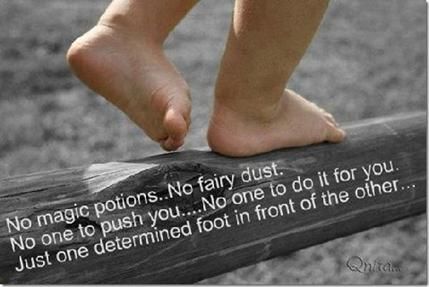 When you repeat a behavior that you want to stop, you’re addicted. We all have these. They’re the responses we give to which we utter the Homer Simpson “D’oh!” or “I wish I hadn’t said that!” But it’s too late. You said it! You always say it! You’re addicted! You say it or do it because it’s in your comfort zone. That part of you that feels warm and fuzzy when you stay within your “rules of life” gets a high from it. Here’s what you can do to finally break the pattern and adopt the behaviors that will get you where you want to be.
When you repeat a behavior that you want to stop, you’re addicted. We all have these. They’re the responses we give to which we utter the Homer Simpson “D’oh!” or “I wish I hadn’t said that!” But it’s too late. You said it! You always say it! You’re addicted! You say it or do it because it’s in your comfort zone. That part of you that feels warm and fuzzy when you stay within your “rules of life” gets a high from it. Here’s what you can do to finally break the pattern and adopt the behaviors that will get you where you want to be.
From Wikipedia:
Addiction is the continued use of a psychoactive drug, or the repetition of a behavior despite adverse consequences, or a neurological impairment leading to such behaviors.
Addictions can include, but are not limited to, drug abuse, exercise addiction, food addiction, sexual addiction, computer addiction, and gambling. Classic hallmarks of addiction include impaired control over substances or behavior, preoccupation with substance or behavior, continued use despite consequences, and denial. Habits and patterns associated with addiction are typically characterized by immediate gratification (short-term reward), coupled with delayed deleterious effects (long-term costs).
The classic symptoms of addiction are usually there when we repeat behaviors over and over again. The need to be right, to hurry, to be perfect, or to see ourselves as one-down all repeat in order to satisfy a M.E.N. (momentary emotional need), which is the same as Wikipedia’s description of “immediate gratification”).
I see these as manifestations of the Knower/Judger. While some substance addictions do not have their foundations in training at an early age, the K/J certainly does. And the reality is that one’s rules of life, from which one executes in order to feel comfortable, are nothing but an addiction.
What to Do About It
Alcoholics and substance addicts often find success in 12-step programs. American Psychological Association summarizes 12-step programs as having the following points. I’ve included an explanation of how these points relate to changing your behavior.
- Admitting that one cannot control one’s addiction or compulsion
I see this as moving from the Unconscious Incompetence stage of learning to the Conscious Competence stage. We finally see (admit) that something we habitually do or say is not serving us well.
- Recognizing a higher power that can give strength
As my coaching clients will attest, I refer to the “Collective Intelligence” frequently. You may call it God, Jesus, Yahweh, or any of a number of names. This helps me focus on my relative insignificance in the whole scheme of things. You see, NASA tells me there are one hundred billion galaxies in the observable universe. Just one of those galaxies, the Milky Way, in which our tiny orb exists, is estimated to have a half-trillion stars, our sun being only one of them. Each star is surrounded by a system of rocks and debris that in some cases totals millions more celestial bodies. We happen to inhabit this one. At this time. And there are over seven billion of us! In this understanding of my personal lack of significance, I am reduced to understanding that I am only graced with anything by honoring my connection to everyone and everything. By honoring that connection, I experience my grace growing. I call it “lucking.”
- Examining past errors with the help of a sponsor (experienced traveler)
Once we’ve reached the level of Conscious Incompetence, we can begin to observe and analyze our past actions and the commensurate results. We can actually see them without the filters of our history obfuscating reality. If the results are not what we want, then we can change the behaviors, but that takes some reprogramming, and a coach at your side can help with that process… keeping the filters out of play… keeping you clear.
- Making amends for these errors
Ho’oponopono encourages this. I love you. I’m sorry. Please forgive me. Thank you. To whom does one make these amends? To the universe… all the connections… the Collective Intelligence…the person you want to get along with, but somehow can’t in the moment. And I don’t see anything as an “error.” That’s too judging for me. Rather than calling something an error, I see it as an action or a conversation that doesn’t take me in the direction I want to go. It’s not right or wrong. It’s just not productive.
- Learning to live a new life with a new code of behavior
Changing one’s Rules of Life. This is tough. We’ve carried these rules around in our minds for 30, 40, or 60 years, only to discover that we’re not connecting as well as we could. We’re not accomplishing our goals. We’re not getting what we want. So we go back in history and figure out when and how we decided this was the rule. What were the circumstances? Who was involved? How did we feel as the decision was made? Do all those parameters exist today? Now? Then perhaps the decision back then is no longer valid for now! With that examination, one can begin to re-decide how the world works and what the new Rules of Life should be.
- Helping others who suffer from the same addictions or compulsions
Once you’re a traveler on this path and have seen its benefits, it’s difficult not to want to help others. A caveat here. Even if your eyes are open, and you’ve done the work, and you’ve re-decided some things about how you interact with the world, you’ll be challenging others’ Rules of Life. Be patient. As you change, those who interact with you will change too. Accept accountability for you and let the others come along at their pace. It’s my experience that you can help more people by authenticating yourself than by making suggestions to others.
Phew! That’s some deep stuff. I very much believe in Ho-oponopono’s concept that we are all personally accountable for everything. Every breath we take, every word we utter, has a ripple effect universally. Sure, the people within earshot are most likely to be affected. But how the Collective Intelligence deals with little ol’ lowly us can be affected by the degree to which we respect it. Karma’s a bitch!



I’d add reward yourself for accomplishing milestones